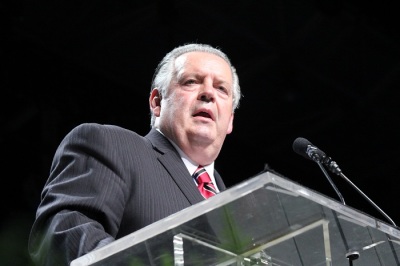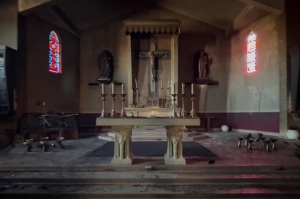Ask Dr. Land: What do you think about George Floyd’s murder and the aftermath?
Question: What are your thoughts on the murder of George Floyd and the aftermath, including the rioting and looting?

Like almost all of my fellow countrymen, I was nauseated and repelled by the video of George Floyd being murdered in front of our very eyes by a uniformed policeman while three other policemen present failed to intervene. For any human being to do that to another human being is an atrocity of unspeakable barbarity.
However, when the perpetrator is a policeman, it is even more heinous. The police are the most visible representation of what the Apostle Paul tells us is the divinely authorized civil magistrate, tasked by the Almighty to punish those who do evil and reward those who do that which is good (Rom. 13:1-7). When a policeman acts in such an unspeakable way, it is even worse because he is involving civil government in his crime because he is a symbol of the state. In short, when a policeman (or policemen) behaves this way, it is nothing short of blasphemous. Let me be as clear as I can possibly be. Every American who claims to be a decent part of the human family has a moral obligation to condemn the grotesque murder of George Floyd and demand that the perpetrators be punished to the fullest extent of the law.
Why am I speaking out on this issue now? Hasn’t enough been said? I believe it is every American’s responsibility to declare their outrage at this atrocity. However, I do have one added incentive. Whenever I feel compelled to speak, or am asked about issues of racial reconciliation in America, I automatically first go to the Holy Scripture —and then to Dr. Martin Luther King Jr., a hero of mine ever since I was a teenager in the early 1960s. Dr. King said, “In the end, we will remember not the words of our enemies, but the silence of our friends.”
Reading these words again, I could not allow my silence to camouflage my anguish and outrage. When I watched the infamous video and it came to the segment where the policeman, Derek Chauvin, in the midst of strangling a helpless George Floyd, stared directly into the camera, I had an immediate flashback in my mind to a picture that appeared in Life magazine in the early 1960s. It was a picture of the “lawmen” who had killed the three Civil Rights workers and buried them under a dam in Mississippi. Then, as now, I was staring into the face of pure, unadulterated evil.
When I turn to the Bible, I see racism condemned from beginning to end. Genesis tells us that “God created man in his own image, in the image of God created he him” (Gen. 1:27) and “Adam called his wife’s name Eve: because she was the mother of all living” (Gen. 3:20, emphasis added). Consequently, there is only one race — the human race. Scientific research is now confirming what the Bible told us all along — we all come from one common ancestor.
And in the New Testament we are informed that “God shows no partiality, but in every nation anyone who fears him and does what is right is acceptable to him” (Acts 1:34), and “He made from one man every nation of mankind to live on all the face of the earth” (Acts 17:26).
And finally, of course, we have the all-encompassing language of the best known verse in the entire Bible, “For God so loved the world that He gave His only begotten Son, that whosoever believeth in Him should not perish, but have everlasting life” (John 3:16, emphasis added).
And when I turn to Dr. King (and I have a pretty thick MLK file), I find him never wavering from his deep commitment both to racial reconciliation and non-violence.
Recently we have seen media try to rewrite Dr. King’s history by repeating this quote, taken entirely out of context: “A riot is the language of the unheard.”
In that interview with Mike Wallace in 1966, he was explaining why the riots were taking place, not condoning them. In fact, he went on to say in that very interview, “I think for the Negro to turn to violence would be both impractical and immoral.”
Even as Dr. King became more politically progressive in the last years before his tragic assassination, he continued to denounce violence. “So I will continue to condemn riots, and continue to say to my brothers and sisters, that this is not the way.”
As his niece Alveda King reiterated, offended by these attempts to co-op her beloved uncle’s memory, “Martin Luther King preached love, not hate; peace, not violence; universal brotherhood, not racism.”
Why? He believed such actions were both immoral and counter-productive.
Earlier, in his incandescent 1963 “Letter from a Birmingham Jail” (which I still believe ought to be required reading for any American high school senior to graduate, right up there with the “Gettysburg Address”), Dr. King explained, “Injustice anywhere is a threat to justice everywhere.” Why? Dr. King understood that “we are caught in an inescapable network of mutuality, tied in a single garment of destiny. Whatever affects one directly, affects all indirectly.” Whenever injustice occurs, all of us are impacted, de-sensitized, and diminished.
Also, the violence is counter-productive. It further rends the social fabric into which we are all woven, and it rends it in ways that are far easier to rend than they are to mend. As Dr. King so astutely observed, “Every time a riot develops,” he warned not long before his murder, “it helps George Wallace.” Sad, but so very true.
When people are forced to choose between order and chaos, a majority will choose order every time, even at the expense of justice.
Once again, let me be unmistakably clear. The right to peaceful protest is guaranteed by the First Amendment, and I will defend that right to the death. I will tell any American, “I disagree with everything you say, and I will defend to my death your right to say it without fear or intimidation.”
However, when you start destroying people’s homes, businesses, and neighborhoods, and when you start injuring and killing people, you have crossed the line. You have no “right” to do that, and you are diminishing every human life and wounding our society in ways that even if and when it mends, will leave painful scar tissue.
We had a very moving moment when this heinous video of George Floyd’s murder went viral. Americans left, right, and center were horrified. We were as unified as I have seen America in a long time. And then, the violence started, desecrating the memory of George Floyd, as his family stated in imploring the violence to stop.
Division, rancor, and compounding violence rapidly ensued. There is nothing about such violence quite as impressive as its ability to generate even more violence.
And, for those who would argue that such actions as the Boston Tea Party justify violent protests, my response is “really, are you truly that ignorant?” The Sons of Liberty threw the tea into the harbor because they had no peaceful redress of grievance that is now guaranteed by the Constitution’s First Amendment. When you have no vote, the moral threshold for protest is much lower than when you have the right to vote out what you believe is injustice and vote in better representatives.
As for me, and my house, we will never abandon Dr. King’s mesmerizing dream that our nation will fully live up to the promises of our founding documents, and we will produce a country where people will be “judged not by the color of their skin, but the content of their character.”
While I draw breath, this dream will never die.
Dr. Richard Land, BA (magna cum laude), Princeton; D.Phil. Oxford; and Th.M., New Orleans Baptist Theological Seminary, was president of the Southern Baptists’ Ethics & Religious Liberty Commission (1988-2013) and has served since 2013 as president of Southern Evangelical Seminary in Charlotte, NC. Dr. Land has been teaching, writing, and speaking on moral and ethical issues for the last half century in addition to pastoring several churches.




























